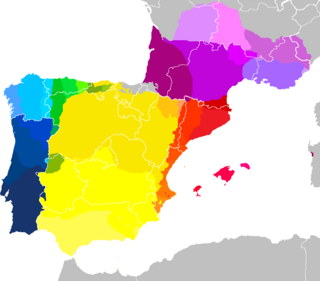
Back Portugués européu AST Европейски португалски език Bulgarian Portuguès europeu Catalan Europäisches Portugiesisch German Eŭropa portugala Esperanto Portugués europeo Spanish Europar portuges Basque Euroopanportugali Finnish Portugués europeo Galician यूरोपीय पुर्तगाली Hindi
| European Portuguese | |
|---|---|
| Portuguese of Portugal Iberian portuguese Peninsular Portuguese | |
| Português europeu | |
| Native to | Portugal |
Native speakers | 10 million (2012)[1] |
| Dialects |
|
| Official status | |
Official language in | |
| Regulated by | Academia das Ciências de Lisboa |
| Language codes | |
| ISO 639-3 | – |
| Glottolog | None |
| IETF | pt-PT |
 Dialectical continuum of Iberian Romance languages including European Portuguese and its dialects.[image reference needed] | |
European Portuguese (Portuguese: português europeu, pronounced [puɾtuˈɣez ewɾuˈpew]), also known as Portuguese of Portugal (Portuguese: português de Portugal), Iberian Portuguese (Portuguese: português ibérico), and Peninsular Portuguese (Portuguese: português peninsular), refers to the dialects of the Portuguese language spoken in Portugal, Angola, Mozambique, São Tomé and Príncipe and Guinea-Bissau. The word "European" was chosen to avoid the clash of "Portuguese Portuguese" ("português português") as opposed to Brazilian Portuguese.
Portuguese is a pluricentric language; it is the same language with several interacting codified standard forms in many countries. Portuguese is a Romance language with Celtic, Germanic, Greek, and Arabic influence. It was spoken in the Iberian Peninsula before as Galician-Portuguese. With the formation of Portugal as a country in the 12th century, the language evolved into Portuguese. In the Spanish province of Galicia to the north of Portugal, the native language is Galician. Both Portuguese and Galician are very similar and natives can understand each other as they share the same recent common ancestor. Portuguese and Spanish are different languages, although they share 89% of their lexicon.[2] European Portuguese is notable among Romance languages in that it is stress-timed, rather than syllable-timed; in this respect it differs even from Brazilian Portuguese.
- ^ Portuguese at Ethnologue (18th ed., 2015) (subscription required)
- ^ Extra, Guus; Yaǧmur, Kutlay (2004). Urban Multilingualism in Europe: Immigrant Minority Languages at Home and School. Clevedon: Multilingual Matters. ISBN 9781853597787.
© MMXXIII Rich X Search. We shall prevail. All rights reserved. Rich X Search